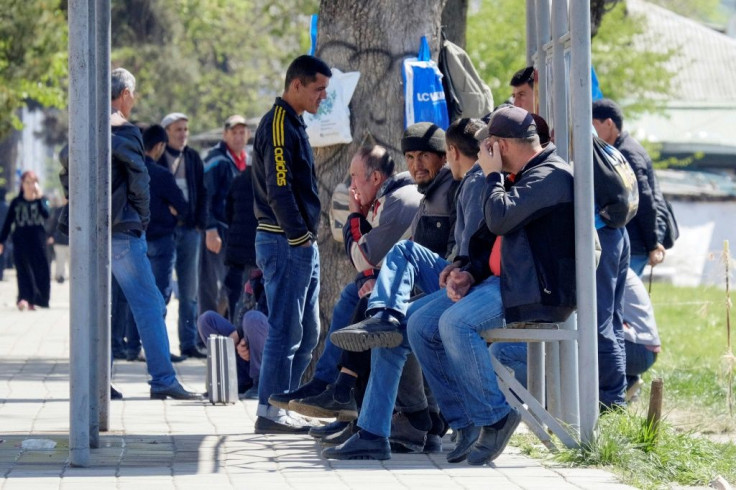Central Asian Migrants Squeezed By Russia's Virus Lockdown
At an odd jobs market in the capital of Tajikistan, the crowds of desperate men hoping to land work are growing.
If Tajikistan's key economic partner, Russia, had not sealed its border in March to slow the spread of the coronavirus, many of the men would be seeking work there.
Instead they are trapped in the poorest country to emerge from the Soviet collapse, where money sent home by migrants -- mostly from Russia -- normally makes up 30 percent of gross domestic product.
For 30-year-old Djomi Sharipov, who was seeking "any type of work", Russia's anti-virus measures that have brought the economy to a grinding halt could not have come at a worse time.
Sharipov had just got clear of a four-year entry ban from Russia for a migration violation and had secured work at a pasta factory outside Moscow.
"Events conspired against me, against all of us," Sharipov told AFP at one of several job markets in Dushanbe.
"If before there were 15 or 20 people standing in this line, now it is 80 or 100."
Russia's measures against the coronavirus, which has ripped through the country in recent weeks, have left hundreds of thousands of migrants unemployed, yet trapped inside the country.
The most desperate took to sleeping in airports early in the crisis as flights were cancelled, hoping for a reversal of fortunes.
Migration centres in Moscow and Saint Petersburg have descended into chaos as crowds of migrants engulfed them wanting to renew work and residence permits.
In response, Russian President Vladimir Putin signed a decree in April exempting millions of guest workers from labour permit payments until mid-June.
That eased the bureaucratic strain on stranded migrants, but has done little to cushion the devastating economic impact of the lockdown, now more than a month old.
Elvira Kurbanova, a 57-year-old from Kyrgyzstan, said she had no desire to return home to Central Asia's most remittance-dependent economy, where she earned less than $200 a month as a bookkeeper.

She just wants the Asian restaurant in Moscow where she and her son were hired last autumn to reopen so she can return to a life that was "falling into place", she told AFP by telephone.
Kurbanova and her son each earned $400 a month at the restaurant and sent around a third of that to help her parents supplement their "tiny pensions".
"But now our landlord wants 20,000 rubles ($265) for the rent. We still haven't received our salaries for February," she said.
With coronavirus cases topping 130,000 and not expected to peak until mid-May, Putin has said Russia will not consider easing virus restrictions until later this month.
Uncertainty over the price of oil also hangs over the countries that live in the economic shadow of their former imperial master and key oil producer.
The Organisation for Economic Cooperation and Development said in an April report that any recession in Russia "will have an impact on the demand for labour, invariably affecting many households across Central Asia".
Mirali Davlatov, a 65-year-old pensioner queuing at a bank in Dushanbe, said the earnings that his two brothers, grandson and son-in-law make from construction in Russia feed his family of 20, including five small children.
But after losing work "they can't get a salary or buy food for themselves, which means they can't send us any money," Davlatov said.
Migrant workers in Russia who are still able to work during the lockdown will continue to do so, said Yan Matusevich, a researcher on migration, because they cannot afford to put their health first.
Central Asians make up a "significant proportion of essential workers" in Russia, with jobs in food processing, manufacturing and the service industry, which have avoided full quarantine, Matusevich said.
Delivery workers, taxi drivers and cashiers often suffer poor working conditions, "and are now particularly exposed to COVID-19", the researcher told AFP.
At the bank, Davlatov said he hoped to God that the pandemic would cease to "torment" not only his family but the whole world.
"Otherwise, there will be no normal life for anyone."
© Copyright AFP 2024. All rights reserved.





















